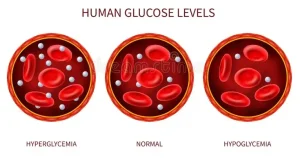Overview
Diabetic hypoglycemia is a condition in which blood glucose levels fall below normal in individuals with diabetes. It most commonly occurs as a side effect of insulin or certain diabetes medications. Low blood sugar can develop quickly and may become dangerous if not treated promptly, affecting brain function and overall safety.
Symptoms
Symptoms of diabetic hypoglycemia can range from mild to severe and may appear suddenly:
-
Shakiness or trembling
-
Sweating
-
Hunger
-
Dizziness or lightheadedness
-
Rapid heartbeat
-
Irritability or mood changes
-
Difficulty concentrating
-
Blurred vision
-
Confusion or unusual behavior
-
Loss of consciousness or seizures in severe cases
Causes
Diabetic hypoglycemia occurs when blood sugar drops too low due to an imbalance between medication, food, and activity:
-
Excess insulin or diabetes medications
-
Skipping or delaying meals
-
Eating too little carbohydrate
-
Increased physical activity without adjustment of food or medication
-
Alcohol consumption, especially on an empty stomach
-
Illness affecting food intake
Risk Factors
Certain factors increase the likelihood of hypoglycemia:
-
Tight blood sugar control
-
Long duration of diabetes
-
Use of insulin or sulfonylurea medications
-
Irregular meal patterns
-
Older age
-
Kidney or liver disease
-
Alcohol use
Complications
If not treated promptly, hypoglycemia can lead to serious complications:
-
Falls and accidents
-
Seizures
-
Loss of consciousness
-
Cardiac rhythm disturbances
-
Brain injury with prolonged episodes
-
Increased fear of future hypoglycemic events
Prevention
Preventive strategies aim to maintain stable blood glucose levels:
-
Regular blood glucose monitoring
-
Eating meals and snacks on a consistent schedule
-
Adjusting medication doses with physical activity
-
Carrying fast-acting glucose at all times
-
Limiting alcohol intake
-
Educating patients and caregivers on early symptom recognition
Advertisement

